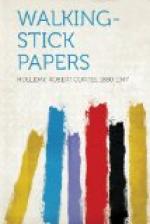“Peace be with the soul of that charitable and Courteous Author who introduced the ingenious way of miscellaneous writing,” wrote Lord Shaftsbury in the opening paragraph of his “Miscellaneous Reflections.” Peace be with the souls of all those who, for the delight of the anointed, have practised that most debonair of all the arts, the ingenious way of miscellaneous writing! Now, as highly successful novelists always say nowadays when interviewed for highly successful newspapers, “I know very little about literature,” but I fancy this benign way of writing had its well-spring in those preposterous days, now long fled, when men of reading were content to give their best thoughts first to their friends and then—ten years or so afterwards—to the “publick.” Its period was the day of the “wits”—those beaux of the mind.
I guess the reason it has gone by the board is that it was what would be called “literary.” And there is nothing we are so scared of to-day as the literary. It was not those dons the critics, we are told on the subway cards, who made Dickens immortal—it was YOU. And our foremost magazines advertise the “un-literary essay.” “Literary expression,” that Addisonian English stuff, whose elegance pleasantly conceals the lack of ideas beneath, is taboo in these parts. What we want is writers who have something to say, and who say it naturally and without any beating about the bush.
While the spell of miscellaneous writing, for those who savour it, is the author’s joyous inability, it would seem, to get any “forrader,” to stick to the point, to carry anything with a rush. See the greatest miscellaneous writer who ever lived, as an admirable later miscellaneous writer the late (in a literary sense) Hon. Augustine Birrell calls him, the Rev. Laurence Sterne. See positively the most buoyant book in all the world; I mean, of course, “The Path to Rome,” by Hilaire Belloc. That glorious newspaper article, “Is Genius Conscious of Its Power?” starts off, indeed, with an allusion to the subject of genius. But the genius of this writer, of such unsurpassed and ingratiating savagery, soon turns to its true business of getting lost in the woods, and we take it from William Hazlitt that all in power are a lot of crooks.




